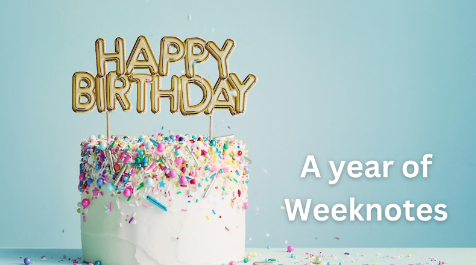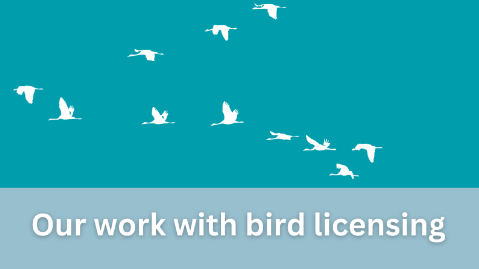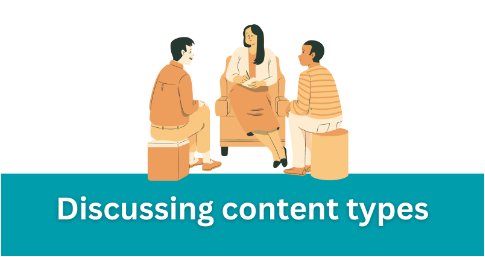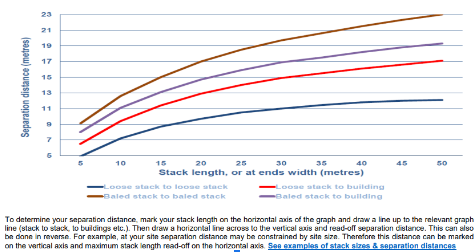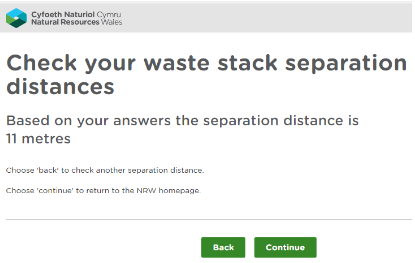Weeknotes 08/12/2023
A whole year of our NRW Digital Team weeknotes
It’s been over a year since we started weeknotes. We’ve:
- worked as a team to never miss a week (thanks for the rota Soph!)
- been brave in sharing our weekly highs and low
- published 52 notes and 55,000 words
- shared our experience with other teams, inside and outside NRW
Why we love weeknotes:
- it’s a chance for each of us to reflect on the week
- we have a record of what we’ve done
- it’s helped us with recruitment
- we’ve connected with other teams working through similar challenges
Our 2024 hopes for weeknotes:
- write and publish in Welsh when we can - within the team, as we want to keep our writing authentic (plus there’s much more important translation work to do!)
- invite colleagues or people we work with to guest weeknotes
- more senior leaders in our organisation and public sector use weeknotes to be open - within their organisations (or public!)
Bird licensing
Phil has been working on updating the bird licences for 2024. In previous years these have been on the website as a PDF. Sophie and Kim moved a lot of the licences from PDF to HTML earlier this year, but they couldn’t go live because we weren’t allowed to swap versions half way through the year. However, next year all the licences will be available to download in HTML format. .GOV have had their bird licences in a HTML format for over a year now, so it was only right that we did the same. Although the bird licences are going live in a HTML format, they are still not perfect. There are plans to improve the entire bird licence section of our website next year.
This has all come about because of the work Natural Resources Wales are doing around the conservation of fish stocks and fish eating birds, such as cormorants. It’s a fine balance to stop fish stocks being depleted and protect these birds. Next year as part of the improvements to this area of our website, there are also plans to:
- improve the user experience of the bird licence forms and to turn these forms into an online format, they are currently all on the website as word docs
- improve the gull management guidance content and form
- add guidance about fish eating birds for both anglers and conservationists
- improve the current bird licences and the way they are displayed on the site
- review forms and guidance from falconry and aviculture to bird control
So, lots to be getting on with.
Working with expert groups
Shaun has been working with the expert group on guidance and applications for hydrogen producers. So far, they’ve agreed on user needs and proposed web pages as well as the different types of permits and applications users will need. He’ll now be pair-writing those pages with the SMEs.
There have been significant changes to our guidance on medium combustion plants following the withdrawal of standard rules permits. Hopefully this will lead to a clearer picture for MCP operators in what is an extremely complex regulatory environment.
Content types and content crits
We’ve had a content request for four pages of content on groundwater – it’s a mix of evidence and data, background information and our plans for improving groundwater quality.
In discussion at the content crit, the consensus was that the majority of it is most suited to a blog with the caveat that there may be a user need around discovering which pollutants are present in a user’s locality.
Installations permit applications
Installations permit application forms and guidance have been exercising the minds of Sam and Shaun this week as they try to understand the application process. The aim is to create a digital application for a bespoke installations permit which:
- is easier for the user to fill in because it is more clearly written and structured
- asks the user only for the information we need from them (it doesn’t present them with information or questions that don’t apply to them)
- helps ensure permitting officers get the information they need to start scrutinising an application
- uses our start and confirmation page patterns
Mapping the paper form flows in MURAL has thrown up lots of questions for SMEs.
Meanwhile, they are using the work done on waste permit applications (lots of it is the same for installations) to start building a prototype in the test website.
Using our form builder as a calculator
Sam’s been playing around with Smart Survey (our form builder) to explore if we can turn some graphs into a simple to use checker/calculator. This is part of a wider piece of work on revising fire prevention management plan guidance for waste permit applicants.
Permit applicants need to know what distances they must keep between their stacks of waste. This will differ depending on the waste type and how they stack it.
Currently, the graphs in our PDF guidance can only give users a rough indication of the separation distance - that’s if they have a pencil, ruler, can see the graph and decipher the colour difference.
But with a checker, users can very quickly (in three clicks) get an answer that’s rounded to the nearest metre. They can do this on any device, anywhere, any time without having to rely on someone or something to help them.
The SME for this area has volunteered several operations and permitting staff who can initially test the checker as they may also need to use it for assessing permit applications and during site visits.
Permission to use land NRW manages
Lots of good stuff is still happening with ‘permissions’ with Laura, Lucinda and Sam:
- making tweaks to the ‘one route in’ application including checking the routes and changing the language where it’s not quite right
- prepping for a show and tell with the permissions team next week
- watching a user research session on applying to film on NRW land, taking notes, and creating a space on our MURAL to record findings and identify themes
In the best news yet, there are signs that (now the right NRW finance forms have been filled in) GOV.UK Pay could soon become a reality for part of this service - what a Christmas present that would be!
Working through a backlog of reports
As we make our way to the end of another year, we are receiving a flurry of requests for new content to be created, reports showing analytics for web pages as well as the usual kind of reports we are sent.
These requests, while they might be time-sensitive, can take us a while to work through, so please be patient with us as we work to fulfil an unprecedented number of requests.
Of course, you can get your content published sooner by completing our content request form and reviewing your content against our organisation’s accessibility standards ahead of sending it in to us. The more accessible your document is when it’s sent to us, the quicker it passes our checks and can be published online.
Other things we’ve been working on
Kim’s been working on the annual report and accounts. Publishing this as HTML isn’t easy or quick.
It comes to us as a hefty Word document. Often we need to re-work the structure because colleagues have used, for example, tables to format text.
We also need to ensure the pages have the correct heading levels, that tables are correctly formatted, that links to related content are accessible, meaningful and that they work - and we need to do all this in English and Welsh.
Planning for 2024
Last week we chatted about the need to seriously consider stopping some things, so that we have more time to focus on “the good chunky stuff of value”.
There will always be things we need to publish, but how can we make space for the team to work to their best - and make the biggest improvement for people accessing our services, and reduce the time colleagues spend on answering questions that should be clear online.
Heledd, Alex and Paul are trying to work out how we have more time as a team to do “the good chunky stuff of value”. We’ll be chatting with the whole team over the coming weeks, then once we have a clear plan within the team, we’ll be sharing our priorities with colleagues in other teams.
Formalising out of hours procedure for emergency web updates
NRW is a Category 1 responder, which means we’ve got lots of colleagues on rotas 24/7 every day of the year.
The ICT team have a rota for any technical issues, and Comms have a rota for news, social media and press enquiries.
The only content updates we’d do out of hours on the website is anything that cannot wait until next working day, for example:
- a global banner for a significant incident affecting all Wales - for example, a major flood incident.
- updates to days out content pages, due to closures / health and safety incident - for example, bike paths closed due to fallen trees
- updates to web pages if there are technical issues impacting our public facing services
We’ve had an informal arrangement for the past few years, but we’re going to formalise our out of hours working so that it’s aligned with organisational working arrangements.
The pros and cons of working in the office
After spending a few more days in the office than usual, Heledd shared some interesting insights.
Many of the challenges and obstacles we face around going into the office are shared amongst our team, including:
- Deciding on and dressing in appropriate work wear is a challenge for many of us. Heledd settled on Lucy and yak dungarees, setting the standard that comfortable fashion is now ‘in’. But she’s also kept an all black jacket to formalise the attire in case of meetings.
- Underestimating the time it takes to get in, whether commuting via public transport, or by car, we can all face unexpected delays which can affect your mood before you even step foot in the office.
- We all like to be productive when out and about, so completing errands on the way adds more time to the journey but allows you to get more out of the day.
- Remembering to bring your entry pass - this is really important for security reasons, but still another faff to remember of a morning.
- Getting lunch and food throughout the day. At the office, the contents of your freezer and cupboards aren’t available, so unless you’ve made that conscious decision to pack lunch, you end up spending at lunchtime.
- Checking through your calendar and any meetings online before you get excited to see colleagues and carried away with in-person chats in the office. When working from home, the day is clearly laid out and distractions are minimised which can be helpful for some of us.
There were many interesting positives that she discovered throughout the week, including:
- The opportunity to branch out from your immediate team’s bubble and reconnect with other teams has been invaluable. Gaining oversight into how busy all teams are, not just our own, has been useful. Overhearing conversations about stress across teams within the organisation has helped build empathy between teams, something we fear has been lacking as of late. With more teams stressed and focussed on their own challenges, it’s harder to see the difficulties other teams are facing.
- Connecting face to face with other humans, there’s nothing quite like it! Our role in Digital is usually positioned behind a screen, providing support and advice to various teams. However, there’s a lot to gain from meeting people in the ‘real world’ and taking those discussions offline wherever possible.
- Heledd has shared the following analogy - that going to the office is much like going to the gym. The hardest step is often just getting yourself there.
Some of this week’s learning:
Watching
Reading
- When you design for everyone, you design for no one - Content Design London
- The Environment Agency transforms regulatory services
- Creating a new intranet - Oxford City Council
Fun fact Friday*
2023 marks the first year that SpotifyWrapped can be navigated using a screen reader. This means blind and partially sighted people can find out their top artists and lots more. *stolen from RNIB Linkedin
